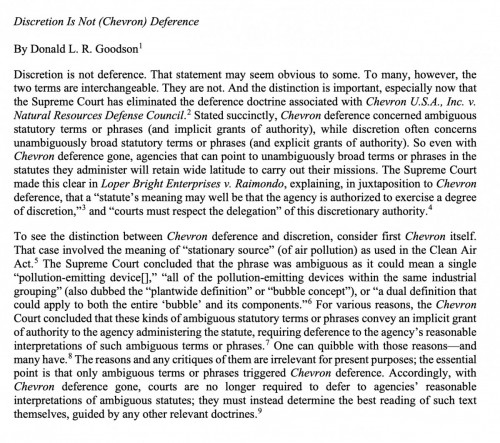-
Comments to EPA Science Advisory Board on Draft Peer Review Report on Draft Revised Environmental Justice Technical Guidance
EPA's Science Advisory Board (SAB) sought comments on its draft peer review report on EPA’s Draft Revised Environmental Justice Technical Guidance (EJTG). This report reviews the methods and procedures described in EPA’s Draft Revised EJTG for evaluating environmental justice concerns in regulatory actions. The Institute for Policy Integrity submitted comments making three key recommendations that the SAB can use to advise EPA.
-
Comments to the Public Utility Commission of Texas on System Reliability Standard
After Winter Storm Uri, the Texas Legislature tasked the Public Utility Commission of Texas with revisiting its standard for system reliability. The Commission responded by proposing a multi-metric reliability standard—one that defines "reliability" not just in terms of the frequency of outages, but also the maximum tolerable duration and magnitude of these events. In our comments, Policy Integrity supported the Commission's overall approach, because multi-metric reliability criteria are an emerging best practice compared to the old one-in-ten approach. We also suggested other ways the Commission could strengthen its proposal.
-
Comments to the Illinois Commerce Commission on Draft Phase 1 Report from Future of Gas Workshops
The Institute for Policy Integrity submitted comments on the Illinois Commerce Commission's (ICC) draft Phase 1 Report from its Future of Gas Workshops, providing recommendations for the ICC to consider as it plans for Phase 2 of the workshops. Our comments aimed to ensure Phase 2 of the workshops thoroughly examines pathways for decarbonizing Illinois' gas system while considering economic, environmental, and equity impacts.
-
Joint Comments to the California Public Utilities Commission on Safety, Reliability, and Resilience Rules for Electrical Distribution Systems
Institute for Policy Integrity submitted joint comments with Columbia Law School's Sabin Center for Climate Change Law on the California Public Utilities Commission's Order Instituting Rulemaking to Update Rules for the Safety, Reliability, and Resiliency of Electrical Distribution Systems. The joint comments emphasize the importance of a comprehensive approach to climate resilience planning across utility sectors.
-

Discretion Is Not (Chevron) Deference
Published in the Harvard Journal on Legislation
Discretion is not deference. That statement may seem obvious to some. To many, however, the two terms are interchangeable. They are not. And the distinction is important, especially now that the Supreme Court has eliminated the deference doctrine associated with Chevron U.S.A., Inc. v. Natural Resources Defense Council. Stated succinctly, deference concerned ambiguous statutory terms or phrases (and implicit grants of authority), while discretion often concerns unambiguously broad statutory terms or phrases (and explicit grants of authority). So even with deference gone, agencies that can point to unambiguously broad terms or phrases in the statutes they administer will retain wide latitude to carry out their missions.
-
Amicus Brief on EPA Good Neighbor Rule
The State of Utah and others filed a lawsuit over EPA’s new Good Neighbor Rule in the U.S. Court of Appeals for the D.C. Circuit. The rule is the latest in a long line of EPA regulations effectuating the requirement that upwind States eliminate emissions that “significantly contribute” to downwind States’ inability to meet certain ambient air quality standards. We filed an amicus brief rebutting multiple arguments against the rule. Our brief explains that addressing the serious and complex spillover effects caused by air pollution was a central justification for the Clean Air Act and EPA’s regulatory impact analysis demonstrates that the rule is economically justified.
-
Major Rules in the Courts
An Empirical Study of Challenges to Federal Agencies’ Major Rules
This working paper summarizes the first empirical study of how major rules, as defined under the Congressional Review Act (CRA), fare in federal court. The study covers each of the 1,870 major rules issued from the CRA’s enactment in 1996 through the end of the Trump Administration. The roughly 24-year period covering four administrations (two from each party) is the longest continuous timespan of any empirical study of agency win rates.
-

Cost-Effective Capacity Markets
In this paper, available on SSRN, we develop a model of a wholesale electricity market with energy and capacity market components to examine the economic relationship between costs and reliability. We investigate the importance of efficient resource accreditation—the amount by which to compensate resources for their contribution to system reliability. We show that "marginal effective load carrying capability," an accreditation method increasingly adopted by system operators, is theoretically optimal.
-
Amicus Brief in Case Challenging the Economic Justifications for Energy Conservation Standards
In 2023, the Department of Energy (DOE) issued new energy conservation standards for consumer water heaters and consumer furnaces. In April 2024, a natural gas trade association challenged the standards in the U.S. Court of Appeals for the D.C. Circuit, arguing that the standards are not economically justified. In response, Policy Integrity filed an amicus brief supporting DOE’s economic analyses and explaining how Petitioners’ and certain amici’s arguments overlook DOE’s sound assumptions and the relevant statutory framework.
-
Comments to EPA on Review of Secondary NAAQS
In April 2024, EPA proposed retaining the secondary national ambient air quality standards (NAAQS) for nitrogen oxides (NOx) and particulate matter (PM) and setting a new annual average standard for sulfur oxides (SOx). Policy Integrity submitted comments arguing that although the Proposed Rule begins to assess the various adverse welfare effects of SOx, NOx, and PM emissions and depositions that different populations may face, EPA should assess, consider, and present more information regarding both distributional impacts and future risks.









